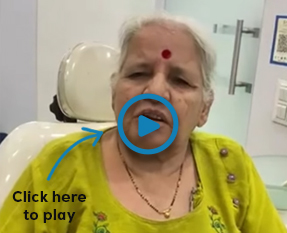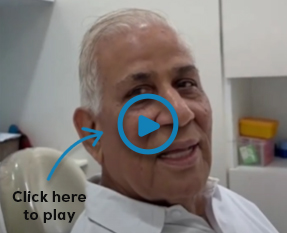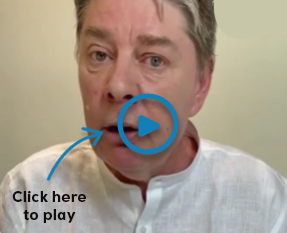What is Tooth Extraction?
Wisdom teeth are also referred to as the third molars, but they often cause a problem during their eruption. They may only emit partially as there is less space in the jaw. Also, they may be wholly embedded in the jaw bone. They use stress on other teeth, causing pain and hence have to be extracted so that it is best to obtain them if infected. At Orthosquare Dental Clinic, we deliver surgical extraction of teeth, which our oral surgeons prepare. Surgical removals are done to extract the teeth. They are not readily available even if they’re not yet fully vented or still under the gum line.
When is tooth extraction recommended?
Healthcare providers prefer to save natural teeth whenever possible. But sometimes, other restorative methods — such as dental fillings or dental crowns — aren’t enough. If your tooth has been badly damaged past the point of repair, then removal may be necessary.
When to Get Tooth Extraction?

Tooth Decay
When tooth decay spreads to the pulp, which is located in the core of the tooth, decay occurs. By invading the pulp, the bacteria cause infections.

Tooth Damage
The first choice is always to keep the patient's teeth when an event, such as a vehicle crash, occurs and the patient needs dental care. If the dental problem is severe, tooth extraction can be necessary.

Extremely Loose Tooth
An extremely loose tooth can occur due to various reasons, such as advanced gum disease, trauma, or significant dental decay.

Overcrowding of Teeth in the Mouth
To relieve overcrowding of the mouth, one or more teeth may need to be extracted.

Periodontal Disease
An infection of the gums, periodontal ligaments, alveolar bone, and other tissues around the teeth is called periodontal disease.

Impacted Wisdom Teeth Which Cause Gum Pain and Swelling
When a tooth is prevented from coming out by tissue or when the gums have not fully erupted, the tooth is said to be impacted.
Discover Dental Bridges and Tooth Extraction Treatment Here

Tooth Extraction Procedure
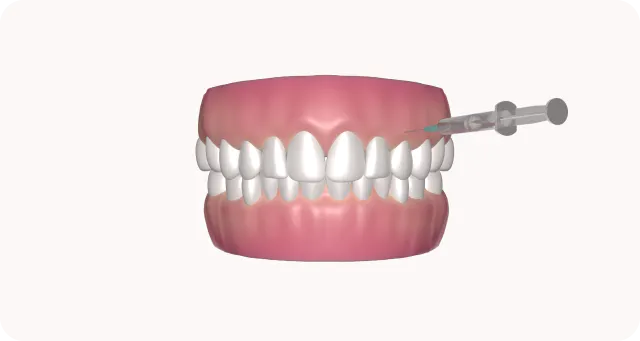
.png) Local Anaesthesia and Preparing for Tooth Extraction
Local Anaesthesia and Preparing for Tooth Extraction
To ensure a comfortable experience during tooth extraction, dentists administer a local anesthetic medication. This medication is injected into the specific region that will be treated, effectively numbing the area and minimizing any pain or discomfort.
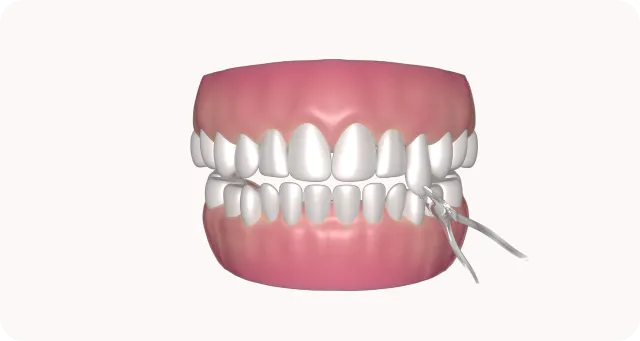
 Extracting the Problem
Extracting the Problem
A small or large elevator is then used to further separate the tooth once the socket has been widened. The whole tooth is then removed using forceps.
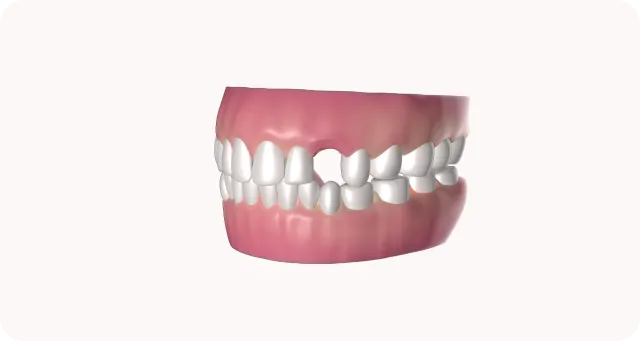
 Post-Extraction Socket Care for Optimal Recovery
Post-Extraction Socket Care for Optimal Recovery
The last of the debris is taken out of the socket and compressed. The bone edges are filed after the socket has been rinsed. In order to stop the bleeding, gauze is placed at the extraction site.
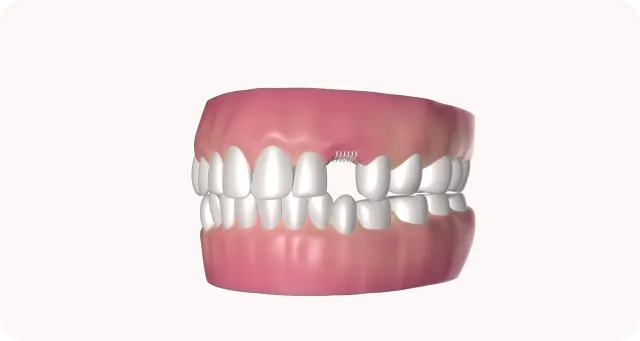
 Post treatment care
Post treatment care
Antibiotics or painkillers may be recommended. If the extraction site is larger, sutures may be used to help the soft tissue properly close. After 7–10 days, the patient is called to schedule suture removal.
Before & After Gallery
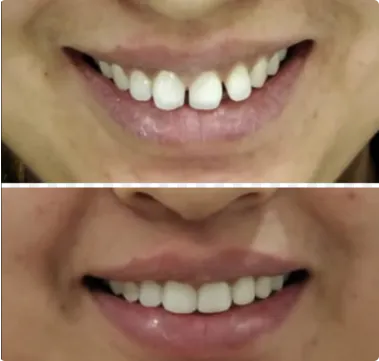
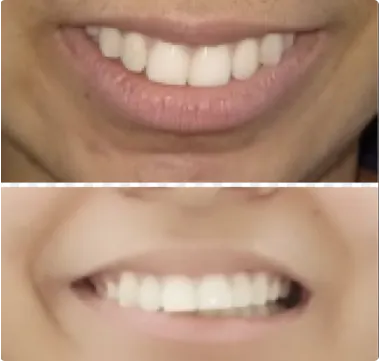
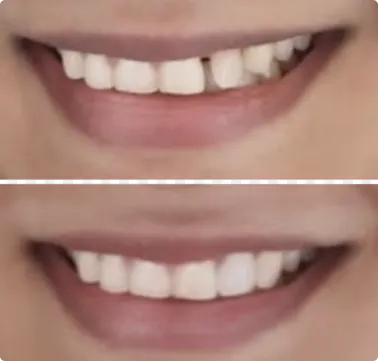
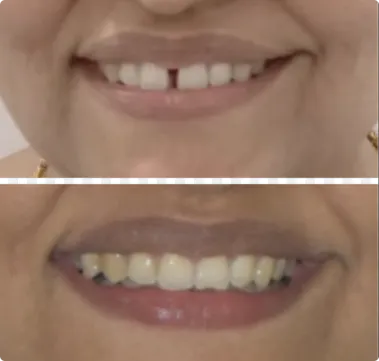

Experience Dental Bridge Solutions and Wisdom Tooth Removal
Our patient's Experiences
Frequently Ask Questions
Tooth extraction is a dental procedure in which a tooth is removed from its socket in the jawbone. This procedure is typically performed when a tooth is severely damaged due to decay, trauma, or infection, and other dental treatments like root canal therapy or dental bonding are not viable options. Additionally, tooth extraction may be necessary for addressing issues such as overcrowding in the mouth, preparation for orthodontic treatments like braces, or the extraction of wisdom teeth. The best dental clinic in Nagpur will conduct a thorough examination and consider various factors before recommending tooth extraction as part of a comprehensive oral health plan that may involve treatments like scaling and root planning, teeth whitening, or the placement of crown and bridges. The process of tooth extraction begins with a detailed assessment of the patient's dental and medical history, followed by X-rays to determine the tooth's condition and position in the jaw. Local anesthesia is commonly administered to numb the area around the tooth, ensuring a pain-free experience during the extraction. The dentist then uses specialized instruments to carefully loosen and remove the tooth from its socket. Post-extraction, patients may receive instructions for aftercare, including recommendations for pain management and oral hygiene practices. Tooth extraction is a common dental procedure performed by skilled professionals at the best dental clinic in Nagpur, ensuring the comfort and well-being of the patient throughout the process. After tooth extraction, there are various options for tooth replacement, such as dental implants, bridges, or complete dentures, depending on the patient's needs and preferences. The decision on tooth replacement may be part of a broader treatment plan that considers cosmetic dentistry options like teeth whitening or orthodontic interventions like braces. Regular follow-up appointments with the dentist at the best dental clinic in Nagpur are essential for monitoring healing and addressing any concerns that may arise after the extraction, contributing to the overall success of the dental procedure and the patient's ongoing oral health.
Tooth extraction serves various purposes in the realm of dentistry, with the primary goal being the removal of a tooth from its socket in the jawbone. This procedure is often necessary when a tooth is severely damaged due to decay, trauma, or infection and is beyond the point of effective restoration through other dental treatments like root canal therapy or dental bonding. Additionally, tooth extraction is employed in cases of severe overcrowding, where the removal of one or more teeth is necessary to create space for proper alignment, making it an essential consideration in orthodontic treatments such as braces. The best dental clinic in Delhi will assess each case individually, considering factors like the patient's oral health, the tooth's condition, and potential treatment options before recommending tooth extraction as part of a comprehensive dental plan that may include scaling and root planing, teeth whitening, or the placement of crown and bridges. Beyond addressing dental issues, tooth extraction is also a preparatory step for various orthodontic treatments. In situations where teeth are misaligned or overcrowded, removing a tooth can facilitate the proper positioning of remaining teeth, creating an environment conducive to successful orthodontic interventions such as braces. Additionally, tooth extraction is a common approach when planning for the placement of dental prosthetics like bridges or complete dentures. This ensures a stable foundation and optimal alignment for the artificial teeth, contributing to the long-term success of these restorative dental treatments.
A dentist determines if a tooth needs to be extracted through a comprehensive assessment that considers various factors. One crucial aspect is the extent of damage or decay affecting the tooth. If the tooth is severely compromised and cannot be effectively restored through treatments like root canal therapy or dental bonding, extraction may be deemed necessary to prevent further complications and maintain overall oral health. Additionally, if a tooth is impacted, causing pain or potential damage to surrounding teeth, extraction may be recommended. The evaluation may involve X-rays to assess the tooth's structure, roots, and surrounding bone, providing a detailed view that aids in the decision-making process. Overcrowding or misalignment of teeth may also prompt a dentist to consider extraction, especially when planning orthodontic interventions like braces. Creating adequate space in the mouth is essential for the success of orthodontic treatments, and extraction can facilitate the proper alignment of remaining teeth. The dentist evaluates the overall dental health of the patient, considering factors such as the condition of adjacent teeth, the patient's bite, and potential aesthetic concerns. The decision to extract a tooth is often part of a broader treatment plan that may include procedures like scaling and root planing, teeth whitening, or the placement of crown and bridges to address comprehensive oral health needs.
Yes, tooth extraction is a common dental procedure performed by dentists worldwide. While dentists strive to preserve natural teeth through various restorative treatments like root canal therapy, dental bonding, or the placement of crown and bridges, there are situations where extraction becomes necessary. Common reasons for tooth extraction include severe decay, trauma, infection, or the need to address issues like overcrowding or misalignment, particularly in the context of orthodontic treatments such as braces. The prevalence of tooth extraction underscores its importance as a fundamental dental intervention to maintain overall oral health and address a range of dental concerns. The commonality of tooth extraction also extends to the preparatory steps for other dental procedures. Tooth extraction may be performed to create space for the placement of dental prosthetics like bridges or complete dentures. This ensures optimal alignment and stability for the artificial teeth, contributing to the long-term success of these restorative treatments. Additionally, advancements in dental techniques and technologies have made the extraction process more comfortable and efficient for patients, minimising discomfort and facilitating a smoother recovery. The frequency of tooth extraction highlights its integral role in comprehensive dental care plans that encompass various treatments such as scaling and root planing, teeth whitening, and other restorative procedures.
Wisdom tooth extraction is a common dental procedure often necessitated by various factors. One primary reason is the potential for impaction. Wisdom teeth, also known as third molars, typically emerge in late adolescence or early adulthood. Due to limited space in the jaw, these teeth may not have enough room to fully erupt, leading to impaction. Impacted wisdom teeth can cause pain, swelling, and pose a risk of infection. Dentists often recommend their extraction to alleviate discomfort and prevent potential damage to surrounding teeth, facilitating overall oral health. The decision for wisdom tooth extraction may be part of a broader dental plan that considers treatments such as braces, teeth whitening, or the placement of crown and bridges. Another common reason for wisdom tooth extraction is their misalignment or angulation. Wisdom teeth may grow at awkward angles, causing them to press against adjacent teeth or the jawbone. This misalignment can lead to crowding, shifting of neighbouring teeth, and potential damage to existing dental work like crowns and bridges. To mitigate these issues and ensure the proper alignment of teeth, dentists may recommend the extraction of wisdom teeth. By addressing these common concerns, wisdom tooth extraction contributes to maintaining optimal oral health and aligns with comprehensive dental care plans that address a range of dental needs, from scaling and root planing to dental bonding.
The difference between a simple and surgical tooth extraction lies in the complexity of the procedure and the condition of the tooth being removed. A simple extraction is typically performed on a tooth that is visible in the mouth and easily accessible by the dentist. This procedure involves the use of specialised instruments to loosen the tooth within its socket and extract it. Simple extractions are commonly employed for teeth that are fully erupted and not impacted, making them suitable for removal without the need for surgical intervention. This type of extraction is often part of routine dental care, addressing issues such as severe decay, trauma, or the need to create space for treatments like braces, teeth whitening, or the placement of crown and bridges. On the other hand, a surgical tooth extraction is a more involved procedure performed when a tooth is impacted or not easily accessible. This may occur with wisdom teeth, which often require surgical extraction due to their location at the back of the mouth and potential impaction. Surgical extractions may also be necessary if a tooth has broken off at the gum line or if it has not fully erupted. During a surgical extraction, the dentist may make an incision in the gum tissue to access the tooth or may need to remove bone surrounding the tooth. While more complex, surgical extractions are routine dental procedures performed with precision to address specific dental issues and contribute to overall oral health, often in conjunction with comprehensive dental care plans involving scaling and root planing, complete dentures, dental bonding, or other restorative treatments.
Directors Regional Heads & Cluster Heads
Our administration and support staff have exceptional skills and are trained to assist you with all medical inquiries. We take pride in being associated with the best dentist in India.

Dr. Kunal Shet
BDS, MDS, Orthodontics & Dentofacial Orthopedics, Implantologist (Masters in Cortical Implantology)
Dr. Kunal Shet is a distinguished dentist with an impressive academic background, including a postgraduate degree in Orthodontics and Dentofacial Orthopedics.

Dr. Riddhi Rathi Shet
BDS, MDS in Orthodontics & Dentofacial Orthopedics, Masters in Cortical and Immediate loading Implantologist (Italy), Masters in Advance Implantology (Smile USA)
Dr. Riddhi Rathi Shet is a highly qualified dental professional with an impressive academic background, including BDS and MDS degrees.

Dr. Sayali Jadhav
BDS, Fellowship in esthetic dentistry and Occlusion Certified Implantologist
Dr. Sayali Jadhav is a highly regarded Certified Implantologist and Esthetic Dentist. Her dental journey commenced in 2014 when she completed her BDS from Dr. DY Patil University.

Dr. Isha Jain
BDS
Dr. Isha Jain, a highly distinguished dentist who proudly graduated from Dr. D. Y. Patil Vidyapeeth, Pune in 2017.
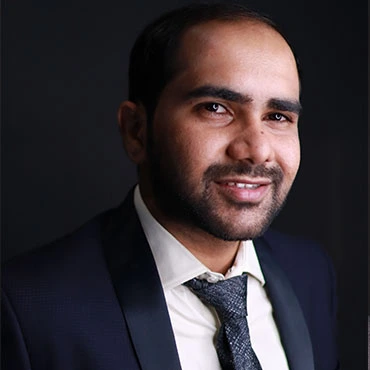
Dr.Akhil Nair
BDS Implantologist
Dr. Akhil Nair is a highly accomplished Certified Implantologist, known for his remarkable contributions to the field of dentistry.

Dr. Akash Balaji Iyer
BDS, MDS Periodontology and Oral Implantology
Dr. Akash Balaji Iyer, an accomplished dentist specializing in Periodontics & Oral Implantology, is a vital part of Orthosquare's expert team.

Dr. Apurva Vaidya
BDS, MDS (Oral and maxillofacial surgery) Implantologist
Dr. Apurva Vivek Vaidya, BDS, MDS in Oral and Maxillofacial Surgery, stands as a distinguished dental professional with specialized expertise in oral and maxillofacial surgery.

Dr. Ruchi Bhansali
Dr. Ruchi Bhansali is a Dentist, Aesthetic smile design, Implantologist, and Periodontology.
Dr. Ruchi Bhansali is a highly qualified and compassionate dentist dedicated to delivering personalized dental care.

Dr. Divya Navsariwala Iyer
BDS. Specialist in Cosmetic Dentistry & Smile Designing.
Dr. Divya Navsariwala Iyer, a distinguished dentist and Smile Designing Specialist, holds the position of Regional Head for Pune at Orthosquare. With a BDS degree from Pravara Institute of Medical Sciences and a remarkable decade of clinical experience, she is recognized for her expertise in smile designing, aesthetics, and dental veneers.

Dr. Dhwani Doshi
BDS
Dr. Dhwani Doshi, BDS, is a distinguished dentist with a specialization in cosmetic dentistry, smile designing, and root canals, holding a certification as an FMR specialist. Graduating from MGM Dental College, Navi Mumbai, in 2013-17, she brings a strong academic foundation to her practice.

Dr. Nehal Gandhi
BDS
Dr. Nehal Gandhi, a distinguished Dental surgeon and Director at Orthosquare Multi-speciality Dental Clinic, stands as a prominent figure in the field of dentistry.

Nilay Vakharia
BDS, MDS (Oral & Maxillofacial Surgery)Implantologist.
Dr. Nilay Vakharia, an OMFS (Oral & Maxillofacial Surgery) specialist, completed his post-graduation in OMFS from Pacific Dental College in 2017.
.webp)
Dr. Shail Kothari
BDS, Specializing in Implantology.
Dr. Shail Kothari is a highly skilled dental professional, specializing in Implantology and Endodontics. He completed his graduation from Dr. D. Y. Patil University in Mumbai and pursued his master's degree in Dentistry from esteemed institutions in Bangalore and the USA.















